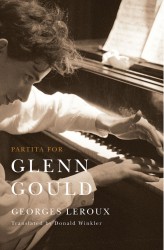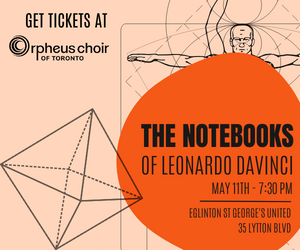 Partita for Glenn Gould:
Partita for Glenn Gould:
An Inquiry into the Nature of Genius
by Georges Leroux
McGill-Queens University Press
256 pages; $34.95
it’s almost thirty years since Glenn Gould died, yet there’s no let-up in the number of books written about him. This study by Georges Leroux, a philosopher who taught at the Université du Québec à Montréal, is one of the best. In what he calls a personal meditation, Leroux throws light on aspects of both Gould’s art and his life. Ultimately he shows how inseparable they were, since right from an early age, Gould devoted his whole life unreservedly to his art.
For all the extraordinary piano recordings, radio and television documentaries and writings Gould left us, he remains famous for giving up live concerts early in his career. Leroux argues that Gould was not abandoning anything, least of all his audience. Gould was searching for disembodied musical perfection, which he couldn’t achieve with live concerts, to share with audiences. This means that his pioneering radio documentaries, like the Idea of the North trilogy, which Leroux rightly calls an ‘unequalled masterpiece’, deserve the same consideration as his piano recordings like the second Goldberg Variations.
Gould’s humming, which can be clearly heard on many of his recordings, would drive recording engineers, critics, conductors, and listeners crazy. But Leroux offers another side, asking, “What is this unsettling song if not a message, a compassionate signal designed to draw in to him those who might risk feeling excluded?” For Leroux, it represents Gould wanting “everyone, through him, to draw near to what is sublime in the work.”
By providing philosophical underpinnings for Gould’s artistic dilemmas, Leroux is able to offer an appreciation of Thomas Bernhard’s, provocative, revealing and often misunderstood novel about Gould, The Loser. Bernhard altered the facts of Gould’s life in significant ways, but he captured what made him an inspiring, visionary genius.
This book is not an introduction to Glenn Gould. Leroux assumes at the least a familiarity with Gould’s playing. Nor is it a biography, though he does discuss events in Gould’s life like his love affair with Cornelia Foss.
Gould’s famous description of art as a “state of wonder and serenity” resonates strongly with Leroux, and shapes his view of Gould’s work. But when Leroux looks at the extraordinary diaries Gould kept from 1977 to 1978 — in one of the most fascinating sections of this book — he sees Gould engulfed by anxiety. Surprisingly, these diaries documenting Gould’s crisis have never been published in their original English, only in a French translation.
Leroux is well-served by his translator, Donald Winkler, who presents the original French text in elegant and lucid English. The English version of the full title, however, is misleading. The original subtitle, Musique et forme de vie, neatly sums up Leroux’s purpose, which he has fulfilled brilliantly, “to study the shape of a life as it is reflected in acts and words, to view it in the context of music as an art, and to take the measure of its generosity.” But An Inquiry into the Nature of Genius describes a different concern, and it’s not Leroux’s here. The absence of footnotes for Leroux’s many references is regrettable — to be unable to track down quotations not just from Gould but from everyone Leroux mentions, from Wittgenstein to Robert Fulford, is frustrating. There is, fortunately, a useful bibliography and detailed index.



